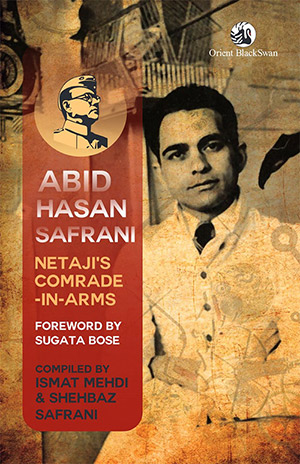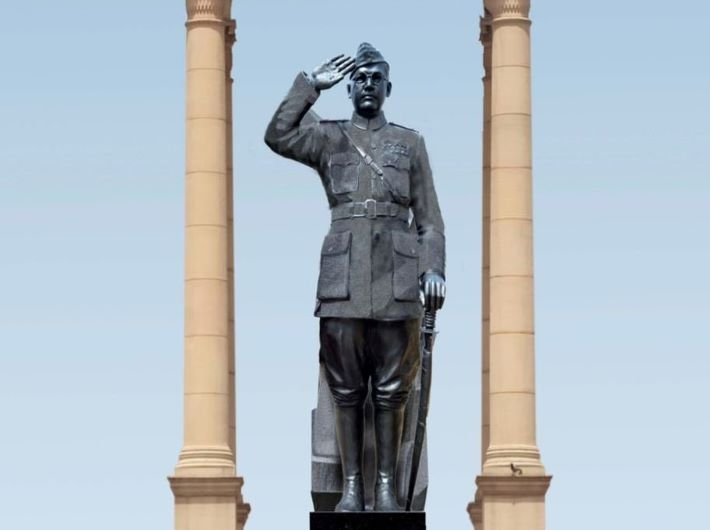Excerpt from an essay by Abid Hasan Safrani: “Netaji divorced religion completely from nationalism. Although a deeply religious man himself, he would not permit public display of any religious practice”
Abid Hasan Safrani: Netaji’s Comrade-in-Arms
Compiled by Ismat Mehdi and Shehbaz Safrani, Foreword by Sugata Bose
Orient BlackSwan, 225 pages, 895.00
 Abid Hasan Safrani, Netaji’s comrade-in-arms, was, in the words of historian Sugata Bose, “a quiet revolutionary who kept himself out of the limelight even while being present at every vital scene and moment of the final phase of our freedom struggle across Europe and Asia.” A member of Netaji’s Azad Hind Fauj, Safrani is famous as the man who coined the slogan ‘Jai Hind’, which became the national salutation for Indian soldiers, statesmen and civilians alike.
Abid Hasan Safrani, Netaji’s comrade-in-arms, was, in the words of historian Sugata Bose, “a quiet revolutionary who kept himself out of the limelight even while being present at every vital scene and moment of the final phase of our freedom struggle across Europe and Asia.” A member of Netaji’s Azad Hind Fauj, Safrani is famous as the man who coined the slogan ‘Jai Hind’, which became the national salutation for Indian soldiers, statesmen and civilians alike.
Safrani grew up in old aristocratic Hyderabad of the 1920s in a richly syncretic, secular culture and a vibrant social and intellectual environment that influenced him deeply, leading him later to plunge into politics under Subhas Bose’s leadership. He went on to become one of Netaji’s closest associates, and was the only one to accompany him on his historic submarine voyage from Kiel in Germany to Japanese territory in Sumatra, Malaysia, during World War II. A polyglot and connoisseur of art and history, Safrani also served independent India as a diplomat of distinction in China, West Asia, Africa and Europe.
Compiled by his niece Ismat Mehdi, who accompanied him on his foreign postings to Bern and Baghdad, and his nephew Shehbaz Safrani, who was with him in Baghdad and Damascus, Abid Hasan’s accounts of his time and journeys with Netaji—collected from his notebooks—bring alive key historical events and fill in crucial gaps in the narration of India’s freedom struggle. Anecdotal memories of Safrani recounted by family and friends also reveal a self-effacing, fiercely loyal, brave and generous man with an endearing persona. The story of an unsung national hero, this book preserves and disseminates some of the finest and forgotten lessons of our freedom struggle, to better understand the evolution of independent India.
From this new book, we reproduce here an excerpt from an essay that was originally published in ‘The Oracle’ of January 1979, and is included in the book by courtesy of the Netaji Research Bureau, Kolkata.
‘NETAJI AND THE INDIAN COMMUNAL QUESTION’*
Abid Hasan Safrani
Communalism is not the disease itself but one of its outward symptoms. Its other symptoms are casteism, groupism, factionalism, regionalism and linguistic fanaticism. The disease itself is the economic malfunctioning in the body politic of our country caused by unequal and disproportionate distribution of the available wealth in the country, leading to large-scale unemployment and massive underemployment. This was acute during the days of the British Raj. Our industry was then limited and its development, especially in new ventures, discouraged.
Research in its fields remaining static, our agriculture too followed old patterns and could not expand. These factors in their turn set limits to the development of trade and free professions. There was thus a time when employment, in particular for the educated youth, could be found mainly in government services. With the government being in a position to manipulate it, the basis was thus found for one community to imagine that another was being preferred in obtaining the opportunity of providing for [an individual] himself and his family. It was this grudge, levelled by one group against another, that formed the basic background for communal disharmony.
Netaji was of the opinion that if employment could be found for everyone, then the basic cause of dissentions between the communities would be removed and the way opened for absolute integration. Finding employment for all was not a utopian dream.
It could be done by the proper distribution of the available wealth. In the Azad Hind Fauj this wealth was mobilised through increasing donations by all the Indians living in South East Asia.
It was then utilised for the distribution of equal rations and uniforms to all ranks. The quantity and quality of the uniforms improved and deteriorated depending on the available funds. The distribution was equal to all—Netaji himself not exempted. When the rations became meagre and at times failed completely, no one grudged because, big and small, all suffered the same fate and given these conditions, my experience is that Indians are capable of tremendous forbearance.
Apart from the rations and uniforms, there was the question of pay. This was not equal for all ranks, but it was as we considered—equitable. The ordinary soldier of the Azad Hind Fauj and the worker of the Azad Hind Dal was paid a salary of Rs 40 a month.
I, as a Major received Rs 120 and the generals, including divisional commanders and the Supreme Commander, Rs 250 a month. From a part of our pay, we augmented our rations. To what extent this was possible one can appreciate considering the fact that a chicken cost at one time Rs 25 and at another Rs 50. Netaji himself set the pattern that no extra money would be channeled in increasing the fare at the table of those who had access to public funds. Half the salaries of those on his personal staff, from himself down to his batman, was given by me personally to the sergeant in the kitchen and proper account of all purchases maintained. This procedure was strictly adhered to and the house being open, the public at large knew that it was indeed being followed.
One may say here that this Spartan way of life could be followed only during a period of emotional upsurge and could not last long. This becomes an academic question and I cannot argue it. I can only say that this period was not at all short, stretching itself over a couple of years. Moreover, Netaji had schemes ready of introducing a planned economy in the country with largescale nationalisation of industries and enterprises together with rationing of food, cloth and essential commodities all over India. This large-scale mobilisation of national resources held promise of proportionate distribution of wealth and the ultimate employment of everyone in the country.
Simultaneously with these measures, Netaji made it known in repeated statements that allocation of responsibility to individuals, in other words the choice of persons in the large-scale government and government-controlled employment and their promotion in it would depend upon merit and there would be no other criterion for it. This was preached and this was practised, and the results were exhilarating. To further his own cause no individual had to seek group or factional loyalties, nor, having come to power, patronise anyone. Achieving responsibility on merit, we executed it with an efficiency which demanded and received respect from everyone. Groupism and factionalism became with time nonexistent in South East Asia.
One regrettable aspect of the rise of nationalism in India was that at an early stage of its development, it became associated with religion as evidenced in the prayer meetings, singing of bhajans etc. In order to find an equally easy approach for the Muslim masses the Khilafat movement was started, which the other nationalists welcomed. This was playing into the hands of the imperialists, who with the passage of time succeeded in facilitating the Muslim League to employ the same sentiments for demanding the separation of the country. Our political future was threatened enough when the British began consulting the Muslim League also, when they were forced to confer with our leaders. It became dark when our leaders also began negotiating with it, giving the Muslim League the required breakthrough and confirming its leaders in their claim of being the spokesmen of the Muslim masses. The demand for separation encouraged other reactionaries in their call for a Hindu Rashtra. All this unleashed the basest feeling in us, which later was to take a deplorable and savage turn.
Netaji divorced religion completely from nationalism. Although a deeply religious man himself, he would not permit public display of any religious practice. Religious devotion thus became the individual concern of each person or, if practised in a group, then restricted to the congregational centres set apart for this purpose. There was to be no intermingling of any other sentiments with Netaji’s political ideology.
[The excerpt reproduced with permission of the publishers.]
